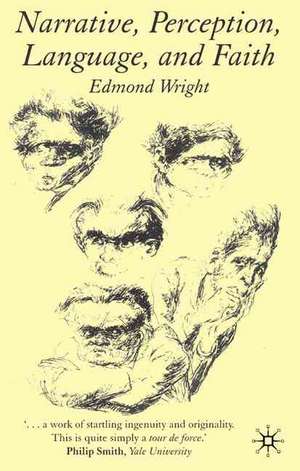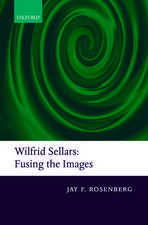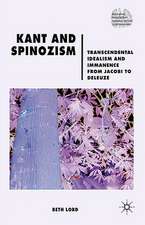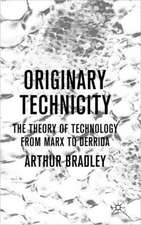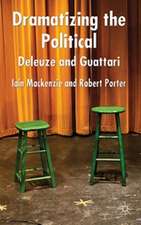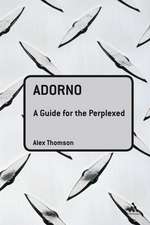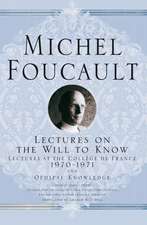Narrative, Perception, Language, and Faith
Autor E. Wrighten Limba Engleză Hardback – 16 noi 2005
| Toate formatele și edițiile | Preț | Express |
|---|---|---|
| Paperback (1) | 384.86 lei 6-8 săpt. | |
| Palgrave Macmillan UK – 16 noi 2005 | 384.86 lei 6-8 săpt. | |
| Hardback (1) | 390.84 lei 6-8 săpt. | |
| Palgrave Macmillan UK – 16 noi 2005 | 390.84 lei 6-8 săpt. |
Preț: 390.84 lei
Nou
Puncte Express: 586
Preț estimativ în valută:
74.79€ • 78.24$ • 62.13£
74.79€ • 78.24$ • 62.13£
Carte tipărită la comandă
Livrare economică 03-17 aprilie
Preluare comenzi: 021 569.72.76
Specificații
ISBN-13: 9781403990679
ISBN-10: 1403990670
Pagini: 256
Ilustrații: XIII, 275 p.
Dimensiuni: 140 x 216 x 18 mm
Greutate: 0.48 kg
Ediția:2005
Editura: Palgrave Macmillan UK
Colecția Palgrave Macmillan
Locul publicării:London, United Kingdom
ISBN-10: 1403990670
Pagini: 256
Ilustrații: XIII, 275 p.
Dimensiuni: 140 x 216 x 18 mm
Greutate: 0.48 kg
Ediția:2005
Editura: Palgrave Macmillan UK
Colecția Palgrave Macmillan
Locul publicării:London, United Kingdom
Cuprins
The Joke The Story A Theory of Perception A Triangle with Fuzzy Corners Language Faith
Recenzii
'Wright offers a highly illuminating take on the way stories inform and inflect our everyday lives - from ordinary speech and jokes to high-risk politics and faith. A philosophical eye-opener for experts and amateurs alike'. - Richard Kearney, Charles Seelig Professor in Philosophy, Boston College
'...a banquet of intellectual nourishment on matters of logic, language, metaphysics, ethics, aesthetics, and religion, showing how inquiries in these several domains intercalate against the backdrop of the uses of narrative. This is no ordinary philosophy book. It will remain on the book shelves for some time to come.' - Calvin O. Schrag, The George Ade Distinguished Professor of Philosophy Emeritus, Purdue University
'Narrative, Perception, Language, and Faith is a work of startling ingenuity and originality. This is quite simply a tour de force. Edmond Wright's thoughtful, engaging and erudite book transcends the conventional barriers that have long divided semiotics from pragmatism, analytic from normative philosophy, materialist realism from social constructivism. At once charming and deeply serious, in his journey from the structure of the joke to the nature of ethical being Wright finds intellectual connections where nobody has even thought of looking. This study will be recognized as a major contribution not only to philosophy, but also to the broader field of social and cultural theory.' - Philip Smith, Department of Sociology, Yale University, USA
'This is a rich and challenging book, ranging from contested philosophical positions to our most mundane assumptions about language and reality. In doing so, Narrative, Perception, Language, and Faith opens a new avenue for reconciling a broad range of research positions in ontology, epistemology, realism, idealism, the relation between logic and natural language, language philosophy, and linguistics in the Saussurean tradition...I would not be at all surprised if this book were to be received as a major breakthrough and spawn a series of new, and long overdue, investigations into the crucial relation between language and perception.' - Horst Ruthrof, Emeritus Professor, Murdoch University, Australia
'Can one imagine a greater contrast than the one between the detached and argumentative, commonsense even, Anglo-Saxon analytic philosophy approach, and the highly speculative and dense style of Lacanian psychoanalysis? Edmond Wright's book brings these two approaches together - and the result is no less than magic, a new, third, space of modern thought. Nothing in psychoanalysis and in analytic thought will look quite the same after reading this book.' - Slavoj Zizek, Professor of Philosophy and Psychoanalysis, The European Graduate School, Switzerland and the University of Ljubljana, Slovenia
'...a highly imaginative and provocative exploration of themes common to jokes, stories, perception and language, in which ambiguity is the central element...[Wright] exploits to great effect the best type of Nietzschean approach: a combination of literary and philosophical themes, both in the fascinating examples drawn upon, as well as the ideal set forth and defended. The book is a richly rewarding study of the role of narrative in philosophical understanding.' - Barry Maund, Professor of Philosophy, University of Western Australia, Australia
'a magisterial book that is nothing less than a grand theory of discourse. The breadth of scholarship that he takes up and coordinates is breathtaking' - Rhetoric Society Quarterly
'This is a controversial book, i.e. it is original, important, clears the mind in salutary fashion, and will incite heated discussion... [Wright's] book is written with the greatest clarity, casts profound new light on language and meaning, and should become essential reading whatever one's intellectual discipline.' - Theory
'...a banquet of intellectual nourishment on matters of logic, language, metaphysics, ethics, aesthetics, and religion, showing how inquiries in these several domains intercalate against the backdrop of the uses of narrative. This is no ordinary philosophy book. It will remain on the book shelves for some time to come.' - Calvin O. Schrag, The George Ade Distinguished Professor of Philosophy Emeritus, Purdue University
'Narrative, Perception, Language, and Faith is a work of startling ingenuity and originality. This is quite simply a tour de force. Edmond Wright's thoughtful, engaging and erudite book transcends the conventional barriers that have long divided semiotics from pragmatism, analytic from normative philosophy, materialist realism from social constructivism. At once charming and deeply serious, in his journey from the structure of the joke to the nature of ethical being Wright finds intellectual connections where nobody has even thought of looking. This study will be recognized as a major contribution not only to philosophy, but also to the broader field of social and cultural theory.' - Philip Smith, Department of Sociology, Yale University, USA
'This is a rich and challenging book, ranging from contested philosophical positions to our most mundane assumptions about language and reality. In doing so, Narrative, Perception, Language, and Faith opens a new avenue for reconciling a broad range of research positions in ontology, epistemology, realism, idealism, the relation between logic and natural language, language philosophy, and linguistics in the Saussurean tradition...I would not be at all surprised if this book were to be received as a major breakthrough and spawn a series of new, and long overdue, investigations into the crucial relation between language and perception.' - Horst Ruthrof, Emeritus Professor, Murdoch University, Australia
'Can one imagine a greater contrast than the one between the detached and argumentative, commonsense even, Anglo-Saxon analytic philosophy approach, and the highly speculative and dense style of Lacanian psychoanalysis? Edmond Wright's book brings these two approaches together - and the result is no less than magic, a new, third, space of modern thought. Nothing in psychoanalysis and in analytic thought will look quite the same after reading this book.' - Slavoj Zizek, Professor of Philosophy and Psychoanalysis, The European Graduate School, Switzerland and the University of Ljubljana, Slovenia
'...a highly imaginative and provocative exploration of themes common to jokes, stories, perception and language, in which ambiguity is the central element...[Wright] exploits to great effect the best type of Nietzschean approach: a combination of literary and philosophical themes, both in the fascinating examples drawn upon, as well as the ideal set forth and defended. The book is a richly rewarding study of the role of narrative in philosophical understanding.' - Barry Maund, Professor of Philosophy, University of Western Australia, Australia
'a magisterial book that is nothing less than a grand theory of discourse. The breadth of scholarship that he takes up and coordinates is breathtaking' - Rhetoric Society Quarterly
'This is a controversial book, i.e. it is original, important, clears the mind in salutary fashion, and will incite heated discussion... [Wright's] book is written with the greatest clarity, casts profound new light on language and meaning, and should become essential reading whatever one's intellectual discipline.' - Theory
Notă biografică
EDMOND WRIGHT holds degrees in both English and Philosophy. His doctoral thesis was on metaphor. He has edited The Case for Qualia (MIT Press, forthcoming), The Ironic Discourse (Poetics Today, 1983), New Representationalisms: Essays in the Philosophy of Perception (Avebury, 1993), and has co-edited with his wife Elizabeth Wright The Zizek Reader (Blackwell, 1999). He has published over sixty articles on language, perception, epistemology and narrative, as well as two books of poetry.
